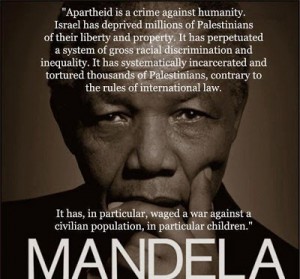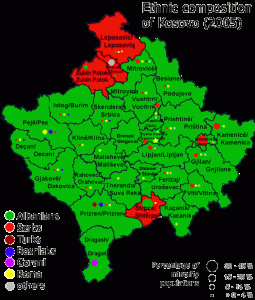
Tip of the Hat to Farhad Abdolian and Mark Thompson at Google+.

Tip of the Hat to Farhad Abdolian and Mark Thompson at Google+.

This is an excellent summary of the context for viewing Israel's latest attack on Gaza
John Mearsheimer, LRB Blog, 16 November 2012
In response to a recent upsurge in tit for tat strikes between Israel and the Palestinians in Gaza, Israel decided to ratchet up the violence even further by assassinating Hamas’s military chief, Ahmad Jabari. Hamas, which had been playing a minor role in these exchanges and even appears to have been interested in working out a long-term ceasefire, predictably responded by launching hundreds of rockets into Israel, a few even landing near Tel Aviv. Not surprisingly, the Israelis have threatened a wider conflict, to include a possible invasion of Gaza to topple Hamas and eliminate the rocket threat.
There is some chance that Operation ‘Pillar of Defence’, as the Israelis are calling their current campaign, might become a full-scale war. But even if it does, it will not put an end to Israel’s troubles in Gaza. After all, Israel launched a devastating war against Hamas in the winter of 2008-9 – Operation Cast Lead – and Hamas is still in power and still firing rockets at Israel. In the summer of 2006 Israel went to war against Hizbullah in order to eliminate its missiles and weaken its political position in Lebanon. That offensive failed as well: Hizbullah has far more missiles today than it had in 2006 and its influence in Lebanon is arguably greater than it was in 2006. Pillar of Defence is likely to share a similar fate.
Israel can use force against Hamas in three distinct ways.
Reality Denial : Steven Pinker's Apologetics for Western-Imperial Volence
By Edward S Herman and David Peterson
ZNET, Wednesday, 25 July 2012
It is amusing to see how eagerly the establishment media have welcomed Steven Pinker’s 2011 tome, The Better Angels of Our Nature: Why Violence Has Declined,[1] which explains not only that “violence has been in decline for long stretches of time,” but that “we may be living in the most peaceful era in our species' existence.”[2] A professor in the Department of Psychology at Harvard University since 2002 and a two-time Pulitzer Prize finalist in the general nonfiction category,[3] Pinker’s lovable theme coincides with the Nobel Peace Laureate’s current engagement in wars on at least four separate continents (Asia, Africa, Europe, and South America); his regretful partial withdrawal from invaded and occupied Iraq; his victorious termination of the 2011 war in Libya; his buildup and threats to engage in even larger wars with Syria and Iran, both already underway with aggressive sanctions and an array of covert actions;[4] his semi-secret and ever-widening use of remote-controlled aerial gunships and death squads in global killing operations;[5] and his declaration of the right to kill any person anywhere for “national security” reasons—officially making the entire world a U.S. free-fire-zone.[6] The Barack Obama regime, and before it the Bush-Cheney regime, have also supported and protected Israel’s escalated ethnic cleansing of Palestinians, and the hostile U.S. actions and threats involving Iran and Syria are closely geared with those of Israel.

Below is a BBC report of and Israeli “calorie” study drafted in support of Israel blockade policies for Gaza. To Israel's credit, an Israeli human rights group forced the release of this report, but it does nevertheless raise a question: What kind of government would authorize work on such a methodical report on this subject in the first place?
“In her reporting of the Eichmann trial for The New Yorker, which evolved into Eichmann in Jerusalem: A Report on the Banality of Evil (1963), Hannah Arendt coined the phrase “the banality of evil” to describe Eichmann. She raised the question of whether evil is radical or simply a function of thoughtlessness, a tendency of ordinary people to obey orders and conform to mass opinion without a critical evaluation of the consequences of their actions and inaction.” (wikipedia)
Read the calorie study (Israeli study of Gaza food consumption to support blockade policy) as well BBC report below, and ask yourself how would you behave if someone was even thinking about doing this to you. Would you fight back with any weapons at your disposal or meekly submit?
Israel forced to release study on Gaza blockade
An Israeli court has forced the release of government research detailing the number of calories Palestinians in Gaza need to consume to avoid malnutrition.
The study was commissioned after Israel tightened its blockade of the territory after Hamas came to power in June 2007.
. . . . . . .
‘Daily humanitarian portion'
The Israeli human rights group Gisha, which campaigns against Israel's Gaza blockade, fought a long legal battle to get the Israeli ministry of defence to release this document.
Dated from 2008 and entitled, Food Consumption in the Gaza Strip – The Red Lines, it is a detailed study of how many calories Palestinians needed to eat to avoid malnutrition.
“How can Israel claim that it is not responsible for civilian life in Gaza – when it controls even the type and quantity of food that Palestinian residents of Gaza are permitted to consume?”
Continue reading “Chuck Spinney: Israeli Micro-Management of Gaza Malnutrition”
Genocide's Definition Revisited
World Affairs, 19 October 2012
If you think you know what Raphael Lemkin, the originator of the term genocide, thought about genocide, think again. A dissertation-in-progress on Lemkin and the history of the United Nations Genocide Convention by Douglas Irvin-Erickson, a doctoral student in global affairs at Rutgers University-Newark, is likely to change how we think and talk about genocide.
As Irvin-Erickson writes in an article (“The Romantic Signature of Raphael Lemkin”) scheduled to appear in the Journal of Genocide Research:
Lemkin used the work of an art historian to define nations as “families of minds”…. Lemkin intended the word genocide to signify the cultural destruction of peoples, which could occur without a perpetrator employing violence at all. In his 1944 Axis Rule in Occupied Europe, Lemkin wrote that genocide was “a coordinated plan of different actions aiming at the destruction of essential foundations of the life of national groups, with the aim of annihilating the groups themselves.” A colonial practice, genocide had two phases: “One, the destruction of the national pattern of the oppressed group; the other, the imposition of the national pattern of the oppressor.”
Genocide, in other words, is not, in Lemkin’s understanding, about mass killing per se, but about the destruction of nations qua nations. Mass killing is, thus, a means to the end of genocide, and not its goal.
Lemkin adopted his definition of a nation as a family of minds in the context of his writing on the French genocide against Algeria, where he believed that the French colonial power was breaking the “bodily and mental integrity” of the Algerian people.… The goal of the genocide, Lemkin wrote, was to integrate Algerians into the French Republic and prevent Algeria from emerging from colonial rule.
Unless the international community demonstrates it is serious abouthuman rights, restitution and disrupting organised crime and criminality, its current policy of stability in place of justice can only continue to fuel both injustice and instability.
TransConflist, 4 October 2012
By James McDonald

On 28 June 1999, Petrija Prljević, a 57 year-old woman in Pristina, was abducted from her apartment by men dressed in KLA uniforms. She was never seen alive again: a year later, her body was exhumed from a cemetery in Kosovo’s capital and positively identified by her son after he recognised items of her clothing. The job of finding out who caused her death was not investigated by the new prosecutors’ office on the basis that she died after the “war” in Kosovo had ended; instead it was investigated by the Eulex Rule of Law Mission. Over ten years later her relatives are still trying to find out what happened to her and who was responsible. Eulex seem no closer to launching an investigation to identify and prosecute her murderers, like the vast majority of the more than 1,000 other cases of murdered Serbs since NATO forces entered Kosovo. Contrast this with the efficient way in which Eulex’s Rule of Law Mission initiated investigations to find the persons responsible for the killing of a member of ROSU in summer 2011. As a recent Amnesty International report made clear, murders continue to be carried out with impunity under the gaze of an international community which seems peculiarly reluctant to investigate them. Indeed, while numerous Yugoslav officials have been tried and convicted for crimes against humanity committed by security forces under their command prior to June 1999, the fact is that of the more than 1,000 Serbs who have been killed since the end of the conflict, almost none have resulted in a prosecution, let alone a conviction. On the contrary, according to the testimony of some international police officials who have worked in Kosovo, there have been active attempts by some elements of the international administration to obstruct investigations, especially when they have threatened to implicate high-ranking Kosovo politicians.
Continue reading “Berto Jongman: Kosovo – Crime without Punishment, Power without Responsibility”

In Occupied Tibetan Monastery, a Reason for Fiery Deaths
DHARAMSALA, India — One young Tibetan monk walked down a street kicking Chinese military vehicles, then left a suicide note condemning an official ban on a religious ceremony. Another smiled often, and preferred to talk about Buddhism rather than politics. A third man, a former monk, liked herding animals with nomads.
All had worn the crimson robes of Kirti Monastery, a venerable institution of learning ringed by mountains on the eastern edge of the Tibetan plateau. All set themselves on fire to protest Chinese rule. Two died.
At least 38 Tibetans have set fire to themselves since 2009, and 29 have died, according to the International Campaign for Tibet, an advocacy group in Washington. The 2,000 or so monks of Kirti Monastery in Sichuan Province have been at the center of the movement, one of the biggest waves of self-immolations in modern history. The acts evoke the self-immolations in the early 1960s by Buddhist monks in South Vietnam to protest the corrupt government in Saigon.
Twenty-five of the self-immolators came from Ngaba, the county that includes Kirti; 15 were young monks or former monks from Kirti, and two were nuns from Mame Dechen Chokorling Nunnery.
See Also: